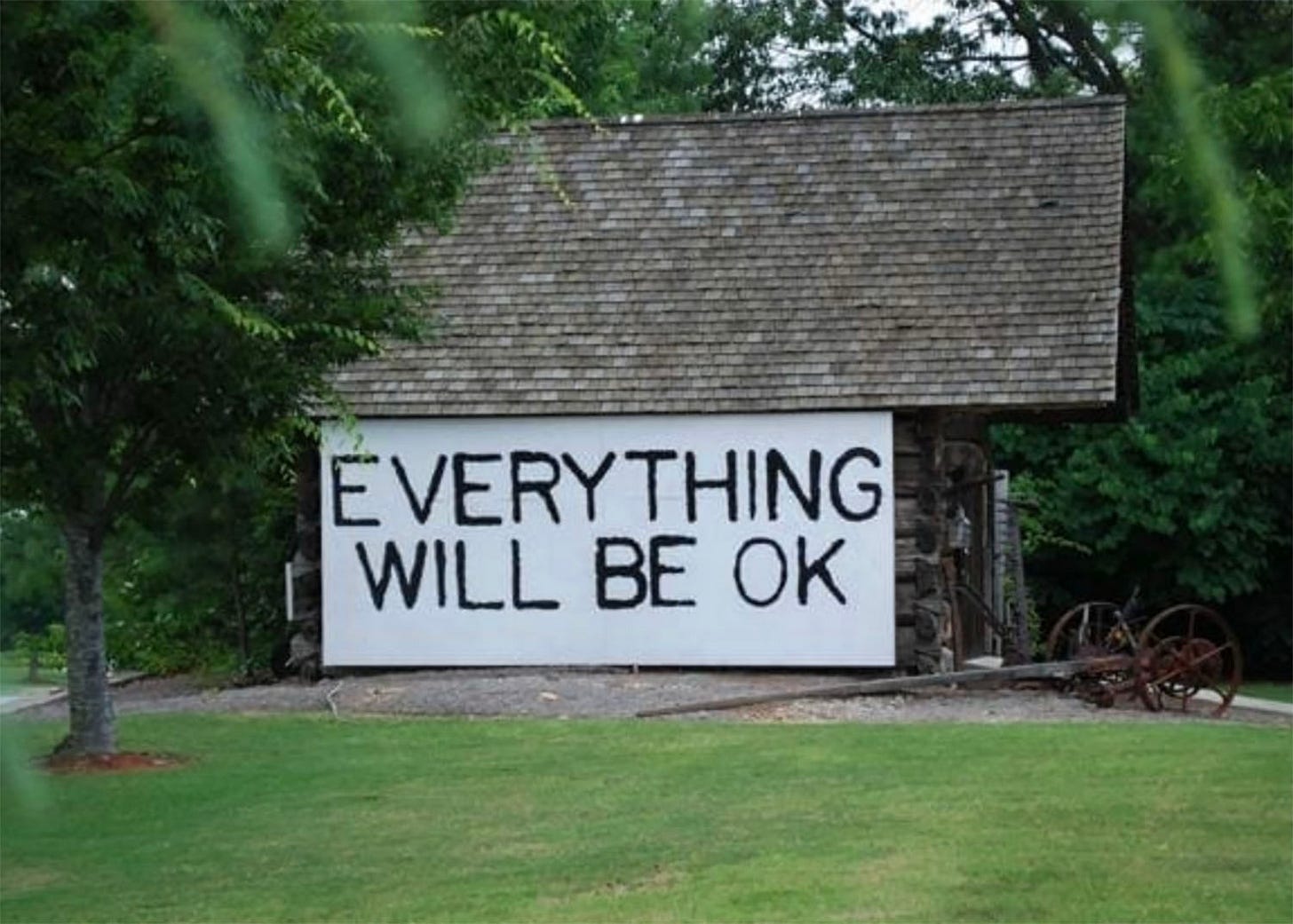Things Are Not Always on the Way to Being Okay
5 Behaviors that May Be Signaling Trauma

Most of the time I’m terribly, deeply offended when people say “Everything will be okay.”
We can debate details, but there are certainly many, m. people on this earth for whom life is not okay.
In fact, I spent a couple of hours this morning reading journal articles about how none of us are okay, because we all have deep-seated trauma and grief over the climate emergency that most of us can’t process. The pandemic didn’t help.
Seeing Trauma Here, There and Everywhere
I look at almost everything through a lens of possible trauma, having been traumatized since birth. I was 6 weeks premature, weighed 4 pounds, 12 ounces, and spent a good amount of time in an incubator with my under-developed lungs.
Those days there weren’t volunteer grannies to come into the NICU and hold you. No hand-knitted hats. There weren’t even NICUs. I was a newborn on my own.
A lens of trauma may sound like a bad thing, but it’s a way to gain more information, and to train myself to be more sensitive to other’s pain. Maybe a bit less judgmental. Perhaps a smidge kinder.
5 Common Behaviors That May Be Signaling Trauma
Busyness
Busyness is pretty common in many cultures in the 21st century. People are busy for many reasons, but too much busyness can signal dysfunction.
I have a friend who’s constantly busy – 4 kids, volunteering at school, food drives, church, she even managed to get herself elected president of the PTA in a place where that was a sign of power and prestige.
I met this friend in therapy. She grew up with an alcoholic father who moved her family every year.
And I know her busyness was to keep herself from thinking or feeling. I met at least 10 people in therapy who aggressively used busyness to avoid feeling their pain.
Dissociating
All 3 of my kids dissociated in different ways, and learning about their dissociation made me realize that my childhood of dedicated reading was trauma-based dissociation.
One child was diagnosed with ADHD inattentive type. My two adopted kids arrived in our family with their dissociative methods well worn. My youngest would hoard food and then hide and eat it.
The two people I know very well who self-injured were quiet, sweet and compassionate. My oldest self-injured as a way to dissociate. It was a shock when I found out.
I felt like a terrible mother.
Agitation or Aggression
If you’re with someone who becomes overwhelmingly agitated and you can’t see a reason why, it could be related to a trauma trigger.
This is sadly something it seems many police officers are not trained to recognize or provide trauma-informed care.
I was sexually abused by my first husband, and one time, with my second husband, right in the middle of the things that married people do, I got triggered and I completely shut down.
I was very agitated, and not able to talk calmly. My husband got freaked out and then angry, unintentionally (or intentionally) feeding the agitation.
It took weeks for me to come all the way back down.
Increased Sense of Fight-or-Flight
I’m sure you’ve seen videos of people who are easily startled, and while it may seem like fun, you may be re-traumatizing them.
One of my children was repeatedly “startled” in the bathroom by a couple of kids in 4th grade, one of the big reasons we decided to homeschool for the following two years.
It’s a power move for abusers to keep you off-balance, and startling can easily be brushed off as “just a joke.”
I would call it gaslighting, and I wouldn’t laugh.
Hypersensitivity
I come from a family of criers. My mom cried every time she heard certain songs including the National Anthem. I was annoyed by this all the way through high school. WTH, you know?
Then I got older and started doing it too. I was appalled.
Crying can be a way for your body to signal that something’s wrong, especially crying at odd times or crying much harder than a situation warrants.
When I see it, I think about possible trauma.
Minimizing Feelings to Make Yourself Feel Better
It’s hard for us to watch other people in pain. There is an urge to make things better, to soften the blow, to say they’ll be okay. There’s an urge to comfort, sometimes accompanied by an urge to do so as quickly as possible.
But sometimes saying “Everything will be okay” is unhelpful and possibly harmful. You may want it to be true, but is it?
When you are puzzled by someone’s response – too intense, not intense enough, surprising or out of character – let your kindness, compassion and curiosity take a look at the situation.
Hold Up a Mirror
Most of these behaviors are also very useful for understanding your own reactions. Does something feel much more uncomfortable than it should? Less uncomfortable? Probably a good reason for that.
Are you numb when it doesn’t make sense? Are you freaked out by something that wasn’t that big a deal? Did you suddenly need to Get. Out. Of. The. Room? Start asking yourself gentle questions.
Rather than being self-critical about over-reacting, accept your feelings and wonder about where they come from. Journal. Mind blank? Make up 10 reasons why someone might feel the way you do. Still nothing? Take a walk, talk to a friend, or forgive yourself for being weird about that thing, and then do something you love. But keep asking questions.
The Gift of Being a Misfit
Sometimes I refer to my little clan as a “family of misfits.” I don’t mean it in a cruel way. Our trauma reactions just seemed to be out and about more than other families.
Maybe I got trauma ESP from my own traumatic childhood. Maybe therapy taught me what to see.
It felt like a burden when my kids were young, but now, now it feels like a gift.




If somebody says everything is OK in a sec, they try to end the conversation. Everything works out when we speak through it. It could be OK at the end of the subject if we have people to talk through to straighten the mind.
I'm always saying/wishing things will be okay.
I think it's a fall back when I don't know what to say to ease someone else's pain.
Even though it's an empty phrase, I keep saying it.
I caught myself saying it 10 minutes before my mother-in-law passed away.
As she lay in incredible pain, gasping in and out of consciousness after giving up eating and drinking days before.
I held her hand. I told her everything would be okay, that she was lovely, that she would feel better soon.
The only true part was that she was lovely. A brilliant MIL.
Everybody knew she was fading, we all knew she was passing away, but still I said those words over and over. Like I was trying to convince myself or something. I don't know why I kept saying a lie, except that they were words of comfort, meant to give comfort in a time the lady who meant so much to me was leaving.